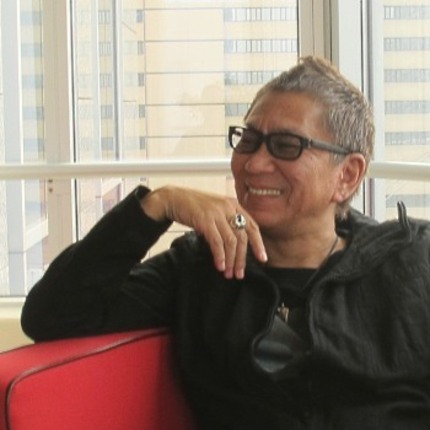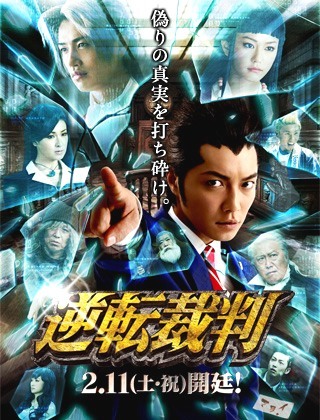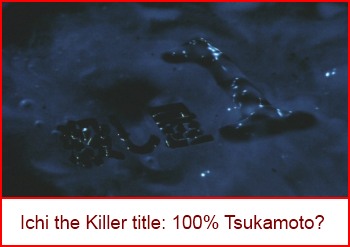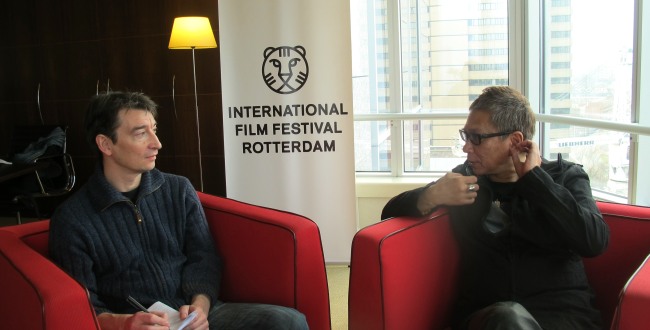IFFR 2012 Interview: MIIKE TAKASHI Talks ACE ATTORNEY

This year the popular and VERY prolific Japanese director Miike Takashi visited the International Film Festival Rotterdam to present his newest film... well, his newest finished one at least: "Ace Attorney", reviewed here (link).
Mr. Miike and the Rotterdam festival have quite a history ever since the IFFR screened "Audition" back in 2000 and awarded it with a critic's award, arguably starting his international recognition.
From then on the festival nearly always had at least one film by Miike Takashi in their program, and last year it even got a rare screening outside of Japan for the extended edition of "13 Assassins".
I'm a fan as well, so needless to say Miike Takashi was high on my list of people I wanted to interview. And thankfully, this year I got to speak with him. I had the perfect icebreaker as well: showing that I had the "Phoenix Wright: Ace Attorney" game on my i-Phone was good for a laugh. But what happened after that? Read on!
AV: Yesterday I attended the World Premiere of "Ace Attorney" and I noticed it got a very positive reaction from the audience. I was wondering: you have made so many films already and experienced so many premieres... were you still nervous for this one?
Miike Takashi: It is the same as when I'm on the set, I feel just as excited as with my first film. That feeling doesn't change. I've made many films, manga adaptations, others, but some things just remain the same. Like when a film is finished and ready for release, I do always get nervous.
And this film especially... I have never made a film quite like this one before. I've done many action movies and thrillers, but this was my first in this genre. So I was extra nervous for this premiere.
AV: Ten years ago I was at the screening of "Ichi the Killer" , and even though you had to give a lecture about "Visitor Q" you briefly appeared at our screening to see how many people had shown up. You told then you were shocked to see over 600 people there. Yesterday, "Ace Attorney" screened in a gigantic venue, the largest we have in Rotterdam. Is that more scary than a small venue?
Miike Takashi: What's easier about smaller venues is that you can be more sure about the audience consisting of fans, or of people who are at least really interested in the film. In large venues a portion of the audience will consist of people who just want a nice evening out and picked a film, any film. I feel far more comfortable with small-size screenings because I know there is a bigger chance that the audience the film is intended for will be there.
For me, a film is only truly finished after an audience has seen it. The audience's reaction creates the film at that moment. So from that point of view I like it best when I know the right audience is watching it, people who really wanted to see that particular film.
AV: Interestingly, there was a press screening a few days ago already, and opinions differed a lot. Many critics were unhappily surprised and you can even say the response was mostly negative. Yet the audience yesterday was wildly positive, people applauding you at the end even. I've seen a couple of applauses already throughout the festival and let me assure you this was quite a big one. The people collecting the rating ballots said they hadn't seen such a positive reaction yet this year. You said in other interviews that you tend to try and find the edge of what's acceptable, and you are known for often using extreme content. So how important is the audience's approval for you?
Miike Takashi: What often happens in Japan is that film critics only appreciate films which conform to their expectations, and react negatively or skeptic towards anything which doesn't. With this film it was important to me that it would not just appeal to hardcore gamers, but also non-gamers and children. I wanted to reach as large and general an audience as possible. For that reason the positive reaction of the public audience was very important to me this time, because it was a way to see how well I had succeeded in this goal.
But then again I might just have gotten lucky with this screening because Rotterdam audiences have always been very friendly towards me.
AV: Ten years ago you brought four films with you: "Agitator", "Visitor Q", "Happiness of the Katakuris" and "Ichi the Killer". Out of those "Ichi the Killer" got the highest audience rating, so I don't know what that says about Rotterdam audiences...
Miike Takashi: (laughs) When you look at how European and American audiences react to Japanese films, or rather Asian films in general, you see that they are drawn to the way violence is portrayed in those films because it is something else from what they see in locally produced films. They like Asian films because they see things that are different. It's frankly why I hope "Ace Attorney" will be a big success because it is in its own way just as different a film as "Ichi the Killer" was, although this time it is not the violence which sets it apart. It gives you something you do not see anywhere else and to be honest I expected a third of the audience to dislike the film to a degree of just leaving the screening before the end.
When "Audition" screened here eleven years ago the young people in the audience were really into it and liked the film, but quite some elderly couples left the screening. Maybe they had expected a nice romantic film? One woman directly behind me even made a point of it to walk around us until she was in front of me and told me in my face: "You are sick!"... (we all laugh)
Luk van Haute (interpreter): I was sitting next to him at the time, and can testify this really happened.
Miike Takashi: ... but the younger people defended me, saying "No, no, it's a wonderful film!". I expected the audience reaction to "Ace Attorney" would be split as well because it still is a bit of a weird, different sort of film, but that didn't happen at all. I was actually startled that no people left the screening.
AV: Well, it is a film you must "get" to enjoy fully I think, you need to be a bit receptive to its silly atmosphere. But people in general liked it a lot. Maybe it helped that many films at the festival are dreary and depressive dramas, so something which is flashy and entertaining is much appreciated after a while.
 Miike Takashi: You might be right, there ARE a lot of art films at the festival this year. I already noticed that when you look at the walls of posters here at the press center or at the Pathé venue, the "Ace Attorney" one-sheet immediately does stand out a lot. (we all laugh)
Miike Takashi: You might be right, there ARE a lot of art films at the festival this year. I already noticed that when you look at the walls of posters here at the press center or at the Pathé venue, the "Ace Attorney" one-sheet immediately does stand out a lot. (we all laugh)
AV: The couple sitting next to me thought they were about to see a serious murder drama, so I warned them that this wasn't going to be something like "The Girl With the Dragon Tattoo". (we all laugh)
And they liked the movie as well. But this does make me wonder: you were under pressure to keep the story close to the one told in the videogames, yet wanted to make a film most people could enjoy. How did you approach that problem? I noticed you kept pretty close to the games. Did it take a long time to get to a filmable script?
Miike Takashi: We actually were still changing and tweaking things during filming. It happened like this: even before the script had been finished there were contractual obligations to Capcom, and the creators of the games were allowed to judge whether or not we had understood the gist of the games. So the script had to reflect that we knew what the games and the characters were about, this had been agreed already. There are people who are mainly interested in the murder mystery, who want to know "whodunnit", or who are interested to see what tricks the heroes use. We had to cater to them. But on the other hand we agreed that the dramatic storytelling side of the original games was underdeveloped, and this we could build by ourselves. It was a big challenge to make one cohesive story out of it as well, given that we were basing it on five games, some of which are only loosely related in plot. It took us all a lot of time to create a script that made sense as one big story. And we needed to flesh out several of the characters, and kept embellishing them even on set during the shoot.
AV: Keeping with the subject of scripts: you are famous for being prolific, releasing several movies a year. This brings with it a certain speed in filmmaking you and your regular crew are used to. In general, how much time do you spend on the scripting stage and how close do you keep to the script during a shoot? Do you leave much room for improvisation?
Miike Takashi: It really differs from film to film. Sometimes I read a script and decide to have it totally rewritten... by the way, that does not mean I fire the writer and redo it myself, as I prefer it if the writer can still keep some of his voice or flavor intact, even after I've told him my thoughts. There are some writers who I know to have delivered excellent work in the past and who I trust implicitly, thinking: "Let's see how this turns out during the shoot". Often it's only during the actual filming that I start to realize what it was the writer was working towards. When I just read the script I sometimes miss that completely, but during the shoot I'd think "Aha, THAT is why you wrote it this way!".
And it is very difficult to create a perfect movie from a perfect script. It's almost as if the reverse is true: it is easier, or rather preferable, if the script has some major faults in it as that allows me as a director to come up with ways to get around those faults. That creative process often leads to a better film.
So my approach depends on the film and differs often. Although I do have to say that lately, it happens less and less that I come across scriptwriters whose work was very good, who I immediately think I'd like to work with. I worry a bit for the future about that.
AV: Really? What would be the cause of that?
Miike Takashi: That has a lot to do with the current way of producing films in Japan. Most films are made by so-called "production-committees" and these tend to think primarily in terms of business, they try to minimize risk as much as possible. While filmmaking still always is something of a gamble. It's the same as betting on horse racing: do you put your money on a lesser-known horse with a lot of risk but also potentially high winnings, or do you put your money on a safer bet where the winnings are more sure but also lower? These committees work by asking everyone's opinion and then trying to reach a general consensus, and start investing in a script that everyone feels happy about. But by doing this they tend to always bet on the safe horse, and the scriptwriters are left with very little room to be creative in. The writers are not allowed to be adventurous.
Sure there are still scriptwriters who produce very interesting scenarios but the chance of me, or anyone else, being allowed to film them is a very small one these days.
AV: Still, there doesn't seem to be a shortage of films for you to work on. I'm not even going to ask you what your next film will be as I'd need to ask what your next TWENTY films would be. How do you choose new projects? And you mentioned in the Q&A yesterday that you took on "Ace Attorney" because you are always looking for new challenges, so what are you now looking for?
Miike Takashi: Looking back at the time when I was still only making low-budget films, V-cinema, films like "Gozu" and... well, it's not much different these days to be honest. The level and scale has changed maybe but the circumstances are still just as challenging. V-cinema also had its own set of rules and limitations, and even THEN I was seen as the odd one out. So these days, even in the current production system, if people ask ME to direct something for them they know what kind of guy they're asking it to. I mean, otherwise they'd be asking for someone else as there sure is plenty of choice at the moment.
When I am approached by producers they expect me to come up with something weird and not to deliver an ordinary film. In that sense I do not feel any pressure to conform. I'm being hired for who I am and people know what they can expect.
But the problem with the current production system is, that if it goes on in its current state for too long, audiences will stop expecting something special from film. A good example is that these days there are lots of films being based on television series which are hits already by themselves. And the only goal for the film is to be as good a copy of the series as possible because that is what the public expects: exactly the same, just a bit larger-scale perhaps with more money involved because it is a movie.
But such films have no surprises in them, and are already bound to known stories. The proportion of such films as opposed to surprising original films is now getting so large, that it creates a downward spiral. People expect less surprising films in cinemas, tend to visit those, these become financially successful so more get made...
And that is how there are less and less interesting films appearing these days.
On the other hand this climate does provide me with enough opportunities to keep on being that odd-one-out guy.
AV: Last year at the IFFR we got "13 Assassins", a truly epic samurai production the likes of which we hadn't seen in decades. This year we have "Ace Attorney" which surely cannot have been easy either. I can see how you can find a challenge in those. But is there something you dearly want to do but haven't done yet? Like a fully animated film for example? A romantic comedy perhaps? A film starring Nicolas Cage? Anything?
Miike Takashi: Oh, definitely. I'd LOVE to do an anime someday. A romantic comedy I'd like to do as well, but to be honest all of my films do contain "love stories" of sorts, no matter which genre I'm working in. The core of my films will generally remain the same whatever I do, as I will always include the same elements which interest me, in whichever form I see fit for the occasion.
As for the one thing I certainly want to do sometime in the future: I have recently made several "jidaigeki", historical films, but these were all remakes of existing films. What fascinates me about for instance Kabuki theater is that it has not changed for several centuries, performing the same stories the exact same way, while the audiences and the country did change and develop. With film, you see that film changes as well. The technical possibilities and circumstances today are much different from those in the past. So what I'd like to do is film an original historical film, with todays knowledge, but using the circumstances we had at the start of cinema. That I would want to try.
 AV: I'm getting a time-warning so I need to wrap up with a final question. Later this week, Shinya Tsukamoto will be visiting the festival and I hope to interview him as well. On the commentary track of "Ichi the Killer", when the film's title emerges from a puddle of sperm you say: "Shinya Tsukamoto provided the sperm, he always gets very excited when he visits my set". (we all laugh)
AV: I'm getting a time-warning so I need to wrap up with a final question. Later this week, Shinya Tsukamoto will be visiting the festival and I hope to interview him as well. On the commentary track of "Ichi the Killer", when the film's title emerges from a puddle of sperm you say: "Shinya Tsukamoto provided the sperm, he always gets very excited when he visits my set". (we all laugh)
Of course I am going to ask him about that, so my question is: do you have any other anecdotes I can confront him with?
Miike Takashi: Tsukamoto will be here? Well... you probably know how, unlike me, he really starts his films from scratch and from that point on he creates everything himself. To be able to do that he needs a lot of strength. To build that up he eats liver, loads of it. The only problem is that when he eats so much liver he easily gets nosebleeds.
This also happened during "Ichi the Killer". At the time we were really short on budget and sometimes we'd run out of fake blood. So whenever we needed more blood we'd give Shinya Tsukamoto a bit of liver and he'd get a nosebleed, providing us with enough of what we needed. Be it sperm of blood, Shinya Tsukamoto is a director from which everything useful just flows... (we all laugh).
AV: Fantastic, rest assured I'll use that one for a question. Thank you very much for this interview.
Miike Takashi: You're welcome.
And unfortunately that was indeed all we had time for, as Mr. Miike had a busy schedule in Rotterdam.
The Tsukamoto interview did happen and I did ask him the sperm question as well. You can find his answers here (link).
I'd like to thank the IFFR press-desk for their help in setting up this interview, and translator Luk van Haute for making any sort of conversation possible. Apart from his expertise in the Japanese language, his general knowledge of Japanese cinema and literature is always helpful whenever films get mentioned as I often don't know the Japanese titles (or when I do, I don't know how to pronounce them).
Luk is the one sitting next to Mr. Miike in the picture below.


Do you feel this content is inappropriate or infringes upon your rights? Click here to report it, or see our DMCA policy.






